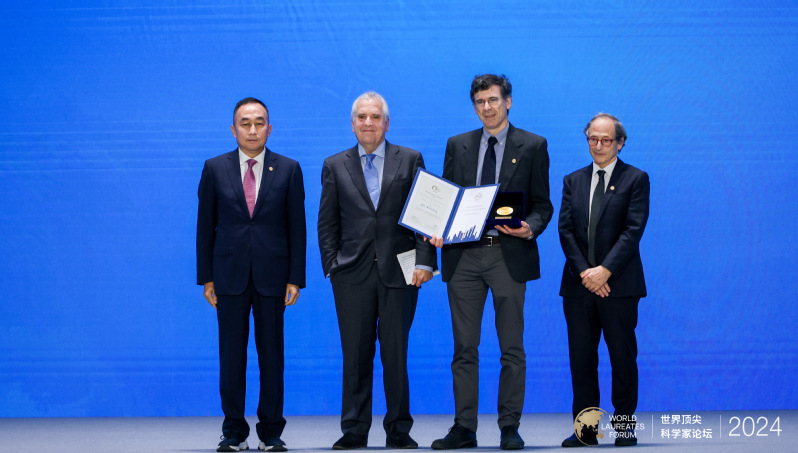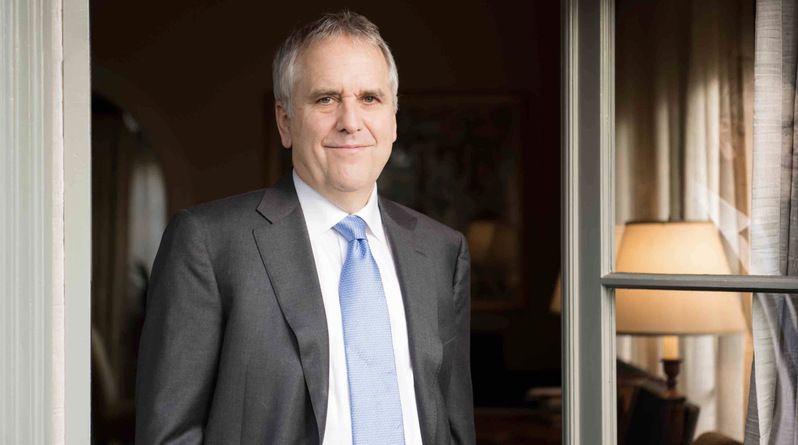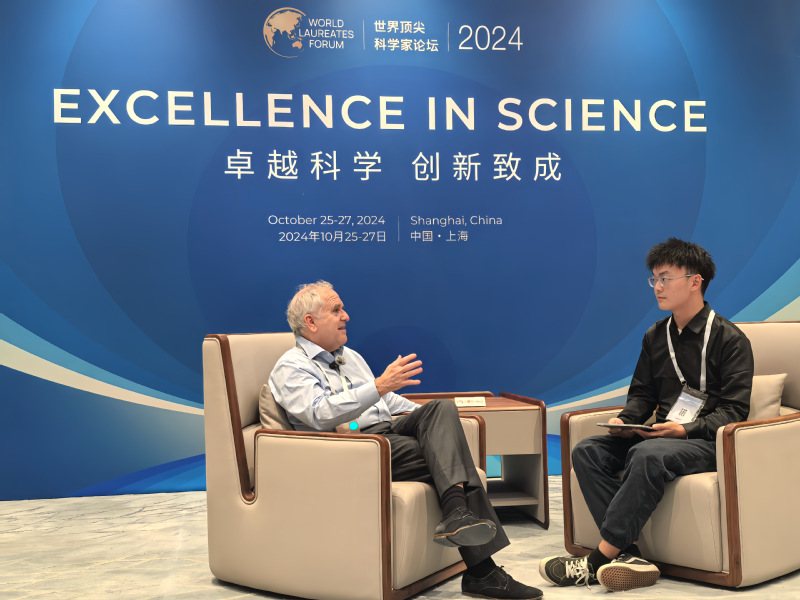By Liu Chang(刘畅), Zhu Shoufu, Liu Chang(刘唱) and Lu liu
“AI systems are not really able to do the truth,” explained Michael I. Jordan during the 2024 WLA Forum in Shanghai on October 25. “It alone does not engage in critical thinking.”
Jordan, often humorously dubbed “the Michael Jordan of machine learning” for his contributions, shared his insights into AI’s future development.
New Perspectives Through Interdisciplinary Exploration
Earlier in the day, at the 2024 WLA Prize Award Ceremony, Jordan shook hands with Jon Kleinberg, who received the WLA Prize for foundational contributions to computer science and social science. Two years earlier, Jordan himself had been honored with the same award by John Hennessy, then chairman of the selection committee and a 2017 Turing Award laureate.

Kleinberg (second from right) receives the WLA Prize in Computer Science or Mathematics, and Michael I. Jordan (second from left) reads the award citation. (Photo: WLA)
“I wish to see something new; diversity matters,” he emphasized, reflecting on his experiences.
Over the past decades, Jordan has exemplified an interdisciplinary approach. Armed with a background in psychology and cognitive science, he integrated insights from these fields into AI and machine learning. He also drew upon theories from statistics, cognitive science, and engineering.
“Studying psychology as an undergraduate helped me understand how people perceive the world, but I wanted a deeper understanding of thought processes,” he explained. Jordan later pursued neuroscience and moved toward statistical science and computing, exploring questions around group dynamics, societal welfare, and collective uncertainty.
In 1985, Jordan obtained his Ph.D. in cognitive science, and later conducted research at the University of Massachusetts and MIT. Since 1998, he has held professorships in electrical engineering and statistics at UC Berkeley.
“Interdisciplinary exploration happens naturally; it provides perspectives I hadn’t considered before, which is thrilling,” he said when asked about his motivations.
During the pandemic, Jordan’s interest turned to virology and the immune system, likening their complexity to a detective story. “Curiosity has always driven me. I’m not drawn to specific fields but to questions that lead me into new areas,” he remarked.
Envisioning AI’s Future Through Collaboration and Insight
In response to Elon Musk’s recent claim that AI is advancing faster than any other technology, Jordan smiled in agreement, describing AI as a fast-moving engine fueled by a constant flow of papers, concepts, and models. “Everyone asks why we need this model and what makes it effective. Answers are evolving rapidly,” he noted.

A photo of Jordan (Photo: Flavia Loreto)
At the 2024 Bund Summit in Shanghai, Jordan highlighted three terms he considers essential for AI’s growth: collectivity, uncertainty, and incentive mechanisms. He believes AI development should prioritize collaboration over individual or national achievements, suggesting that incentive structures could guide AI systems to achieve goals through cooperation.
“I’m not defining AI’s future solely by models,” he noted, “but envisioning it through collaboration and insight.”
When the conversation shifted to AI tools like Midjourney, Jordan admitted he rarely used such applications and felt minimal influence by AI in daily life. He replied, smiling, “These may not be closely aligned with my research direction.”
However, when it came to the topic of multimodal technology, he became animated. He elucidated that multimodal AI could bridge textual understanding with sensory experiences, pointing to a lamp in the room. “If I only interpret language, as ChatGPT does, it may appear to understand. But true understanding requires integrating visuals and text, like seeing a lamp fall and break.”
Jordan suggested multimodal technology could help AI develop a better grasp of reality, potentially enhancing reasoning abilities.
While AI’s advancement faces challenges requiring substantial investment, these obstacles drive humans to push the boundaries of intelligence. Recently, DeepMind CEO Demis Hassabis projected AGI could be a decade away. Jordan, however, emphasized the complexity of defining intelligence: “What do we mean by intelligence—human, market, or something else? In Silicon Valley, vague definitions often serve as funding buzzwords but aren’t necessarily scientific concepts.”
Embrace Challenges, Avoid Pursuing Immediate Success
Interdisciplinary study brings challenges. “The exploration journey isn’t always smooth,” Jordan said. “It wasn’t until my 30s that my career began to take shape.” Reflecting on his path, Jordan offered earnest advice: don’t fear obstacles, and avoid seeking quick success. “Stay curious, and let specific problems guide your research. Discover what hasn’t been found yet,” he advised. “Problems will lead you to where you’re meant to go.”
Jordan continued, advising patience. “If you fixate on immediate success, it often backfires. So, be patient.” Recognizing the uncertainty early-career researchers often feel, he sympathized with their anxiety. “Everyone is unique, and finding a path aligned with your goals is crucial.” Jordan frequently reminds his students not to obsess over short-term results or let fear of the unknown halt new pursuits. He advocates for a multi-channel approach to learning, encouraging conversations with mentors and peers, and immersion in quality literature and resources. With a warm smile, he added, “In a few years, you’ll naturally know what to pursue and how.”

Michael I. Jordan is interviewed by People's Daily.(Photo provided to People's Daily)
Guided by his philosophy of patience, courage, and communication, Jordan has nurtured many accomplished scholars, including Andrew Ng, Zoubin Ghahramani, Tommi Jaakkola, Lawrence Saul, and David Blei, all prominent figures in machine learning. Stanford professor and Coursera founder Andrew Ng publicly stated, “Professor Jordan was my mentor in machine learning, and his guidance profoundly impacted my work.” Turing Award winner Yoshua Bengio also praised Jordan’s influence: “He is a pioneer in statistical learning and AI.”
During the interview, Jordan also spoke enthusiastically about his hobbies. “I enjoy drumming and often play with a band,” he said, gesturing as if holding drumsticks. “Every time I sit at the drums, it feels like a conversation with myself. My hands, eyes, and feet work together, and each beat reflects a rhythm that keeps pushing me forward.” He smiled, recalling the joy of practice. “Practice makes everything smoother, and I love that journey of self-reflection and growth.”

